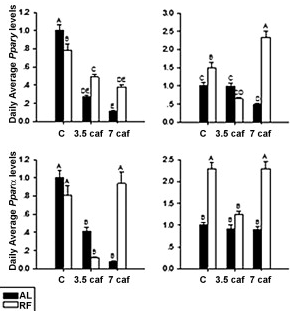Low Dose Caffeine Ameliorates Catabolic Effects and Increases AMPK and PPAR Expression During Reduced Food Intake in Mice
Caffeine, "the mother of all stimulants", has lately developed a bad reputation. Stress, Cortisol, Adrenal Fatique, Insulin Resistance etc. are only the most recognized buzzwords occurring within the context of caffeine consumption. A very recent paper (Shermann. 2011) coming from scientists from the University of Jerusalem draws a wholly different picture.
Shermann et al. investigated the effect of caffeine consumption (3.5 mg/kg/day or 7 mg/kg/day) on circadian rhythms and expression of disease and metabolic markers in mice under two distinct dietary conditions over a period of sixteen weeks. When the rats were fed an ad libitum diet (meaning they could consume as much food as they wanted), ...
This is particularly valid given the fact that there was a highly significant increase in PPAR-Gamma, PPAR-Alpha (cf. figure 1) and AMPK (not shown) activities in the group receiving "high dose" (7mg/kg; for humans this would equal a pretty low dose of about 0.6mg/kg) caffeine. Both, peroxisome proliferator activated receptor (PPAR), as well as AMPK are regarded as master metabolic regulators that have been implicated in the physiology of fat loss. A moderate caffeine consumption, i.e. about one cup of coffee, in the course of an intermittent fast, may thus well spare muscle protein and burn body fat, at the same time.
Shermann et al. investigated the effect of caffeine consumption (3.5 mg/kg/day or 7 mg/kg/day) on circadian rhythms and expression of disease and metabolic markers in mice under two distinct dietary conditions over a period of sixteen weeks. When the rats were fed an ad libitum diet (meaning they could consume as much food as they wanted), ...
caffeine reduced the average daily mRNA levels of certain disease and inflammatory markers, such as liver alpha fetoprotein (Afp), C-reactive protein (Crp), jejunum alanine aminotransferase (Alt), growth arrest and DNA damage 45β (Gadd45β), Interleukin 1α (Il-1α), Il-1β mRNA and serum plasminogen activator inhibitor 1 (PAI-1).For those of you who still want to shed some pounds of fat, it may yet be even more interesting to read that "caffeine supplementation led to decreased expression of catabolic factors under RF". With the RF = restricted feeding condition being comparable to what is known as "intermittent fasting" in the fitness community, this finding is highly significant.
 |
| Figure 1: Metabolic markers PPAR-Gamma (above) and PPAR-Alpha (below) in mice fed an ad libitum (AL) or a restricted diet (RF) (Shermann. 2011) |


